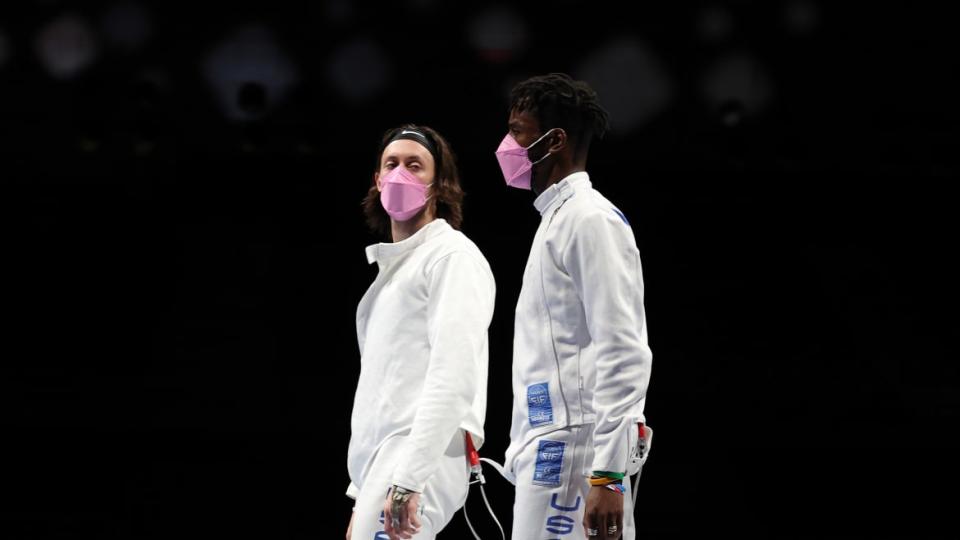U.S. Men’s Fencing Team Dons Pink Masks in Protest of Teammate Accused of Sexual Misconduct

Members of the U.S. men’s Olympic fencing team took a decisive stand against one of their own Friday, wearing pink face masks Friday in protest of a teammate accused of sexual misconduct being allowed to participate in the Tokyo games.
Alen Hadzic, an alternate, was the lone man in a black mask as he stood beside his teammates Jake Hoyle, Curtis McDowald, and Yeisser Ramirez before the épée team faced off against Japan.
clearer pictures of the three Tean USA men's épée Olympians wearing pink masks as a show of support for women in fencing https://t.co/GgSOdfl0rs pic.twitter.com/iSIBmblI3x
— Bradford William Davis (@BWDBWDBWD) July 30, 2021
The 29-year-old said he was outraged with his teammates over their protest of him, telling USA Today Sports that he confronted Hoyle and Ramirez. Hadzic said he asked to wear a pink mask before he realized what his teammates were doing.
“I just remember thinking it would be kind of silly if I stood out there with a black mask and I asked them if they had an extra (pink) one, and they go, ‘Oh, no,’” he said.
“I just told [Hoyle] I was frankly embarrassed to be his teammate,” Hadzic said. “I was embarrassed to stand up there with him.” He said he “chewed” Ramirez out, saying “I told him it wasn’t cool.” Ramirez later shared on his Instagram story a post praising the men’s fencing team.
The 29-year-old was accused of sexual misconduct by three women in incidents that took place between 2013 and 2015. During his time at Columbia University, he was suspended from campus for a year as a result of a Title IX investigation into claims that he sexually abused another fencer during a party, according to a Buzzfeed News report. He was also expelled from fencing at the university.
Hadzic, who has also been accused of violent behavior, has repeatedly denied the accusations, calling them “untruths.”
“They never asked me for my side of the story,” Hadzic complained of his teammates. “They never asked for evidence or how I felt.”
Hadzic’s participation in the Olympics has been highly controversial, beginning when he made the U.S. men’s team in May. USA Fencing had to disable its Instagram comments on a post announcing his qualification when his former teammates began to slam the organization.
Former Columbia University fencing captain Katie Angen wrote that it was “disgusting” that “US fencing let’s [sic] someone who actively preys on drunk and sober women represent our country.”
Taking matters into her own hands, Angen and two other women made a formal complaint against Hadzic to the U.S. Center for SafeSport, an independent agency created in 2017 to ensure the safety of Olympic athletes from sexual or physical abuse. As a result of their complaints, SafeSport temporarily suspended Hadzic in June.
But he appealed the decision, and an arbitrator overturned it later that month. The arbitrator determined a suspension was “inappropriate to the allegations” and claimed Hadzic representing the country would not be “detrimental to the reputation of the United States or his sport.”
As a result, USA Fencing created a widely slammed “safety plan” to keep Hadzic at bay from other athletes. The fencer was flown out to Tokyo on a separate plane from the rest of the team, isn’t allowed to stay in the Olympic Village, and can’t practice in the same area as the women’s team.
Hadzic also tried to appeal those restrictions but was denied after both the U.S. men’s and women’s fencing teams submitted a letter demanding for the safety plan be enforced.
Although the U.S. men’s fencing team’s time is over in Tokyo after losing the match to Japan and taking home ninth place, people still want answers over how Hadzic was ever allowed to qualify for the Olympics.
“I hope that all the reporters/members of the fencing community/members of the public who are celebrating the men’s epee team wearing pink masks don’t treat this as the happy, feel-good ending to this story,” Jackie Dubrovich, a member of the U.S. women’s fencing team, wrote in an scathing Instagram story.
“Alen was still allowed to join the team. He hasn’t been held accountable. And there’s been no accountability for the people/systems that enabled him. US Fencing hasn’t given a plausible explanation for their claimed ignorance about his predatory and violent behavior, which spanned almost a decade.”
Dubrovich then demanded to know who among Hadzic’s coaches and teammates knew about his alleged behavior and “turned an eye.”
“I hope that we don’t get too caught up in the warm and fuzzies of symbolic gestures that we forget to ask those questions,” she added. “Performative activism does not address the issue at hand. The people/systems who enabled and protected a violent predator are not being held accountable. Female athletes were not protected, and our safety was deemed unimportant. It’s time we get some answers and accountability.”
Get our top stories in your inbox every day. Sign up now!
Daily Beast Membership: Beast Inside goes deeper on the stories that matter to you. Learn more.

 Yahoo Sport
Yahoo Sport 





































